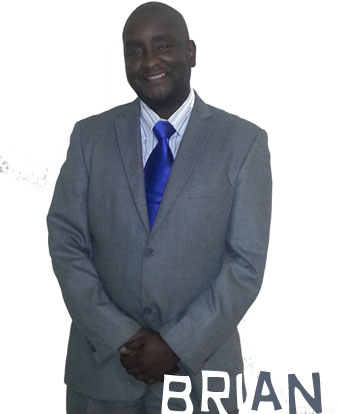
A moving story of a Kenyan in Perth, Western Australia in urgent need of a kidney donor. A gripping recollection of the painful road to diagnosis of a life threatening disease and the momentous obstacles he has faced. He is prayerful and hopeful that the time is right for someone to come forward and save him from the gallows of this ordeal.
Kip: G’day Brian
Brian: G’day mate!
Kip: How long have you been in Australia?
Brian: I am a veteran. I came here in 1998, however in 2005, I went back to Kenya for 2 years to help with things at home…
Kip: 2 years? Not many people get to do that.
Brian: Yeah, I was waiting for my PR application which worked out well. I was back home to help with everything, look after the kids, while my sisters had the transplants in India. I got my PR and then I came back.
A Special Appeal
Kip: We are doing this interview to reach out to potential donors. Let’s jump to the deep end …
Brian: How do you put it in the right way…to ask people. Because asking for a kidney is not a small thing. But that is something I ultimately want. So … I don’t know what would be the best way to put it.
Kip: My initial research tells me some countries require documentary evidence about a prior relationship with the donor, like photos taken together previously… do they have those kind of hoops to jump here in Australia?
Brian: No such hoops here. The main thing they are concerned about, that they will ask is whether the donor has been approached financially. That is one thing they will not take lightly. For example if you came forward, one of the first questions the hospital will ask you is whether I have offered you any financial incentive, for you to be willing to donate your kidney.
Kip: So long as it is not financially induced, anyone could be a potential donor. Right?
Brian: Yeah, as long as no money changes hands. They don’t care whether it is a friend or a relative, as long as it is something you have done willingly, without having been approached (financially).
Preliminary Tests
Kip: What does somebody need to become a donor? Any preliminary tests?
Brian: The first main test that you would need is a blood group test. Because it is recommended that the donor be a blood group B+ which is my blood group but not essential as they can still do the transplant if you have a different blood group.
But if you have a different blood group, recent medical advances will make it possible to have the transplant except that there will be a lot more medication. I would have to take anti rejection tablets, which basically suppresses the immune system. So they want as good a match as possible, because the more they suppress my immune system the more am open to a lot of other diseases and infections.
Kip: Got it…
Brian: And the other thing is, of course you can’t be hep-c or hep-b …hepatitis, or have high blood pressure or diabetes. Diabetes and high blood pressure are major causes of kidney failure. So of course if you have that they will not touch you. You basically get your blood tested by your GP and those are the things they will test for. And if you pass the first set of tests, then you go for rigorous testing which will be done at the hospital.
Kip: What efforts so far have been done towards finding a donor… has someone come up and said “am willing to donate”? or “am willing to take the tests”?
Brian: I have had someone who has been testing for the last nine months but unfortunately, that fell through. There was a slight complication on the donor’s side with his anatomy. The doctors felt there might be a threat to him if they went ahead with the transplant, otherwise I was supposed to have had the surgery a couple of weeks ago.
A Family in Turmoil
Kip: In your interview on 6PR I heard something about your mum having been here in Perth.
Brian: Mum came to Perth last year, she came to see if she can be a donor. She also went through a lot of the tests. But they were a bit concerned with my mum because of her age. She was 66 at the time and their cut off point for donors is 65. We could not go ahead with the operation, because one of the doctor’s feeling was that by mum doing it, it might expose her to getting the same problems because of her age. So we did not want to fix one problem by creating another.
Kip: What about your family, you mentioned that your sisters had transplants when you were in Kenya.
Brian: I have two sisters and we have all got it now. Doctors have still not figured out why. It is a case unlike any they have ever seen.
Kip: Baffling them?
Brian: Baffling them because the disease is not in any of the other relatives.
Kip: So none of the extended family has it?
Brian: No one else has it. It is just our family, and not anyone in the extended family. It is not something like many people would think…it is not alcohol… my two sisters hardly drank… I am the one who used to drink, but gave that up. It is a stereotype that people have….they think, oh it might be the alcohol. But the truth is, it is a medical mystery.
Kip: When was the first diagnosis for any of you.?
Brian: 1999 my sister Stella was diagnosed.
Kip: Tell me, what did she have to go through?
Brian: She went through a lot of dialysis.
Kip: In Kenya?
Brian: Yeah. Financially it is extremely straining. She went through dialysis from 1999 until 2004, when a friend of hers came forward and said, you know what, I am going to give it a shot. So they went through the testing and he was a match. They went and had the transplant in India and he is absolutely fine to date. Since 2004 he has never had a problem, still drinks like he used to. He says one of the biggest things for him was knowing that he had given someone else a better chance, and it has not affected his life in any way.
Kip: And how is Stella now?
Brian: Stella unfortunately had a very rough battle with the disease and went into kidney failure again two years later. And then she had a transplant but lost the battle; in 2008 she passed away.
Kip: Oh, sorry about that.
Brian: Mmmmh thats ok thanks.
Kip: And your other sister?
Brian: Nelly is fine. When Stella’s first kidney transplant failed, 3 months later, Nelly contracted the disease. So they had the transplant together in 2006 in India. Since then Nelly has been fine, she has not had a problem at all.
Kip: Why India? Don’t they have the facilities for transplants in Kenya?
Brian: They do now, except… I don’t know if it has changed now, but part of the reason we were going to India was that the doctors there are really good and it was cheaper to fly to India and get the operation done.
The Road to Diagnosis
Kip: When your sister was diagnosed at the beginning did you try to become a donor? Or how did you find out that you had the disease?
Brian: I got tested initially when I had just come to Australia… and then I got the news a year later. I did try to get tested to see if I would be a suitable match, but at the time medicine obviously had not evolved as much, they ruled me out because of my blood group. My sisters were O and I am a B+. So they said that I could not donate because of having a different blood group.
Kip: But they did not diagnose the disease on you at the time?
Brian: I was fine at the time, my body was fine. I had no problem.
Kip: How did it come to dawn on you that you may have it? Did you fall sick (or what happened)?
Brian: I fell sick in 2008. When I went home for Stella’s funeral, I was completely fine. When I came back from Kenya, three to four months after I came back, I became very sick over those months, and I started losing weight, loss of appetite, I had a lot of trouble breathing, but I pushed myself and went to the mines.
Kip: Oh, you used to work at the mines at the time?
Brian: Yes. I thought that it must be the body that was tired from the hard yakka, the long hours, but finally I decided to go for a check up. This was in December 2008 after I had come back from Kenya. I told the doctors that I was having trouble breathing and everything… they said that I sounded like I was getting symptoms of asthma. They put me on Ventolin and said lets see how you go. I kept using the Ventolin then a month later I still felt ill. By Christmas I was extremely sick but still working.
Kip: What did you do then?
Brian: I went to the doctors and said, look, I still don’t feel right. I used to get lots of muscle cramps, loss of appetite. They did the blood tests on a Monday then told me that I would get the test results back in two to three days. I went back to duty, like normal. The doctor called the office and said “we really need to speak to Brian urgently”. The office paged me on the 2-way as I was out in the bush.
They stressed that it was both urgent and important. So I drove back to the office and called the hospital. They said that they needed to see me urgently. I asked, can it wait? am at work. They were like, nope, we really need to see you now. I told my boss and he said take the work ute and drive to town and I will see you later.
Kip: Where was this?
Brian: Kalgoorlie. But we were working about 200-300 kms inland, out of Kalgoorlie town. So I drove to town, went to see the doctor, and the doctor told me that they needed to admit me straight away. He said my blood results were those of a person who is critical, in ICU and that he did not understand what I was doing working, leave alone working in the mines. I thought it was a joke. I knew I was not well, but did not think it was that bad.
Kip: Must have been a big shock to you?
Brian: Yeah. The first thing they did, they took me to the Kalgoorlie Regional Hospital and started running some tests and liaising with specialists in Perth. 2-3 days of testing… meanwhile I still had the work truck, they had to send someone to pick it up from the hospital.
Kip: Up to that time you still thought that you had asthma? As per the initial doctors…
Brian: The doctors thought it was asthma. I am the one who thought it was not. They said that they had to fly me to Royal Perth Hospital for further tests. I wanted to go and pack my bags, but they said “get someone to do it for you. We have a duty of care we cannot let you out of the hospital… in the condition you are in”. I got my friend to go and pack my bags and bring them. I have never gone back to Kalgoorlie ever since.
A Living Hell
Kip: When you were admitted, how did they break the news to you? …that it had something to do with your kidneys?
Brian: They immediately told me that my kidney function had deteriorated really badly and I had to be put on dialysis immediately.
Kip: What was your state of mind at that time? Knowing what your sisters had gone through.
Brian: It was turmoil, to say the least. It was hell. Absolute hell. But it had to be done. On that same day I was flown to Royal Perth Hospital, I was in the operating theater getting prepared to start dialysis and on that night I was on the dialysis machine, and have not stopped since.
Kip: What happens at the dialysis machine?
Brian: Basically they drain your blood into a machine. The machine cleans your blood and pumps it back into your body.
Kip: How much blood do they have to drain?
Brian: All of my blood.
Kip: All of it?
Brain: Yeah, but they don’t drain it all out in one hit. I get connected to two pipes, so they clean it up and push it back again at the same time. You have to sit there for four hours.
Kip: Four hours? And you do this twice a week?
Brian: Three times a week.
Kip: Oh.
Brian: I still have my full time job. So I call this my second job.
Kip: Brian… you have gone through a lot. I will publish this interview on the blog to get your story out. I hope someone will be touched enough to come forward and take the tests.
Brian: Thank you.
Kip: One last thing, how can someone reading this get in-touch with you directly?.
Brian: Please contact me via email. My email address is [email protected].
A special request
With Brian’s blessings, Kip would like to spread this interview to as many people as possible. This will increase the odds of this message being read by the person who will ultimately come forward. Please support Kip in this mission by inviting as many of your friends via SMS, Email, Facebook and through the Share Buttons below, to check out this interview. Thank you.


Touching story. God bless you Brian to get a donor soon
I’m always with you in prayer and will always be here for you as a close friend. God Bless you and heal you soon.
May God Shower you with blessings and you get a donor soon???
Brian, in my prayers knowing that there is nothing impossible with God!
Brian, just remember to be strong and to banish any fear or doubt. Bear in mind the Lord is with you wherever you go….Joshua 1:9. Stay blessed and remember you are always in my prayers. Love you cuzin. God bless. Wambui
We keep u in prayers Brian.